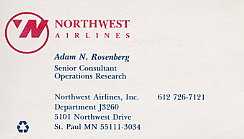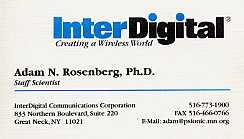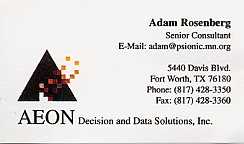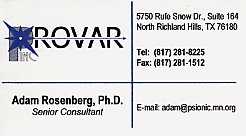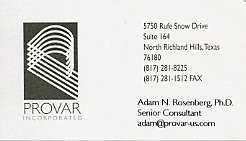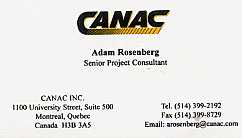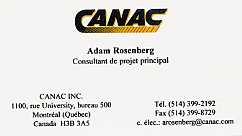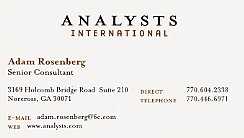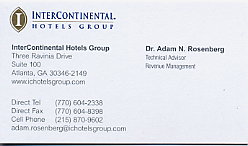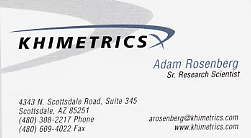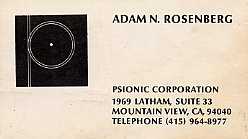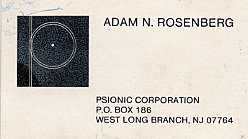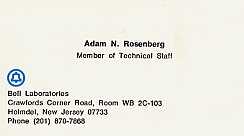
|

|
Bell Telephone Laboratories.
What could be more a bastion of stability and security
than the telephone company, the Bell System,
the crown jewel of America's think tanks?
I joined the systems engineering department,
the group of designers and inventors,
for the up-and-coming cellular telephone technology,
a department with a decade of history behind it.
Alas, the political decay was all-but-complete
by the time I joined in 1982.
Saddled with larger and less-capable development teams,
we were frustrated with and ultimately overwhelmed by
the politics of these larger organizations.
When our department was to be moved closer to these developers,
forty-two of the forty-eight members of our department
had new jobs in six weeks.
AT&T Bell Laboratories.
I tried three other departments at the Labs
searching for the magic something that made
my first department so wonderful,
but something was clearly wrong with the Labs,
a growing anti-intellectual technophobia.
(Remember, this is the think tank that invented
the C programming language.
When the American National Standards Institute (ANSI)
turned C from a bad joke into a credible product,
they invented C++.)
What was apparent to me when I left Bell Labs in 1991
became obvious to a lot of other people a few years later
in the demise of Lucent Technologies.
Northwest Airlines.
As things were crumbling at AT&T Bell Laboratories,
Barry Freedman was appointed
Director of a new Operations Research group
at NWA.
There were many heartfelt promises from the highest levels
of management.
The fourth largest airline in the United States was in trouble,
even then,
and realized that their path to salvation
included making better business decisions.
Their attention span was too short, however,
and the promises had already started to fade
by the time I showed up for work.
Barry lasted less than two years at NWA
before heading off to
greener pastures.
The O.R. group was put in the Information Systems (I.S.) department,
an organization more concerned with protecting its political position
than doing anything to help the airline.
I discovered opportunities to help people in several areas
of the airline
and many of my tools are still in use a decade later
even though I.S. was happy to be rid of a thorn in their side
upon my departure.
(The O.R. group is still wretchedly, miserably
struggling to add value to the business
in a morass of piss, politics, and prostate pain
even though the vice president in charge of I.S.
is an Operations Research graduate
with a Ph.D. from Cornell University,
a very sad story.)
InterDigital Communications Corporation.
This company did much of the original research
in code division multiple access (CDMA),
the latest-and-greatest wireless telephone technology
with about 200 million subscribers worldwide.
IDC
was a company about schisms.
We had the older-technology manufacturing group in Pennsylvania
and the new-technology engineering-research group in Long Island.
I worked in the Long Island group
on the mathematics of CDMA capacity:
How many mobile telephone subscribers could our technology serve?
We had a revenue stream from a rich patent library
defended by lawyers
and we had new designs being developed in a laboratory
by engineers.
The company never seemed to be able to turn those designs
into a working product in the CDMA marketplace,
so my work on computing the system capacity
and finding procedures for optimum deployment of equipment
was not adding value to IDC.
(I recently wrote a
book on CDMA,
so the work added value to somebody, just not IDC.)
As I did not enjoy living on Long Island,
I decided this was a good time to shop for a new job.
Aeon, Provar, SourceProse.
Working for John Howard was
the most interesting,
and the most turbulent,
in my career.
I joined Aeon Decision and Data Solutions,
a seven-person team
on-site in Fort Lauderdale, Florida,
working on a contract
to predict used car "residual values"
for AutoNation USA,
a system that outperformed
the various blue books and black books for cars
but never got off the ground for trucks.
The AutoNation USA contract and Aeon ended,
so John started Provar
with a railroad simulation contract for
the Burlington-Northern Santa Fe Railway
and I moved from Fort Lauderdale to Fort Worth.
BNSF did not continue the work,
Provar changed its name to
SourceProse,
and we got a contract with Federal Flood
to automate their flood-plain determination process.
We digitally scanned 106,000 paper flood-plain maps
issued by the Federal Emergency Management Agency
and developed a database for flood plain certifications.
The
FloodScape
system establishes
whether or not real-estate properties (by street address)
are inside FEMA-designated flood plains,
whether or not the properties require flood insurance
as part of their financing package.
My contribution was image-processing software
that processes digital map files (in TIFF format)
and finds all the shaded-gray flood-plain areas.
The tricky part is not to confuse
flood plains with dark letters, roads, and other markings.
Just to make it harder,
as my great-grandfather used to say,
some of the maps use newspaper-dot-style "stipple"
for their shaded-gray flood plains.
CANAC became interested in acquiring the railroad work,
along with its inventor,
and I was sold to them.
I miss working for John,
but the flood plain work has not generated enough revenue
to support having me on their team full-time.
CANAC
At that time
the Canadian National Railroad had
a subsidiary rail consulting company called
CANAC
in Montréal, Québec.
(In 2004 CANAC was acquired by Savag Companies of Salt Lake City, Utah.)
The breadth of work done there is intriguing,
everything from high level rail planning consulting
to a locomotive remote control device called BELTPACK.
They bought the rail simulation work I did for BNSF
and they spent a lot more money to acquire
a less sophisticated simulation called RAILS
which they developed into a new product.
(I got the feeling they bought my work and hired me
to keep the other simulation off the market.)
CNR and CANAC decided their future was in a rail-service area
which fell short of expectations.
While I survived a round of layoffs,
I was an expensive employee for them
because I was paid in U.S. dollars instead of Canadian
and they were paying for my commute from Fort Worth, Texas.
As I predicted,
there were more layoffs
and I found another job before I was laid off.
Bass Hotels and Resorts,
Six Continents Hotels, InterContinental Hotels Group.
So I worked at Six Continents Hotels,
now the
InterContinental Hotels Group,
formerly Bass Hotels and Resorts, and,
before that, Holiday Inn Worldwide and Holiday Hospitality.
I have been laid off once,
had a total of three separate jobs for this company,
and survived a recent round of layoffs.
And why did I join this company in such turmoil?
Because it was sold to me as a bastion of stability,
a comfortable, conservative company
with a fifty-year history of business success
starting with Holiday Inn,
with £2000 million in cash reserves,
and with a long-term corporate commitment
to revenue management, Operations Research, and decision support.
In just two years,
upper management has piloted the company
into hundreds of millions of pounds of debt,
down two levels in the bond ratings,
and into an embarrassing and difficult
post-layoff, low-morale hiring environment.
Another frustration is that Atlanta
is a shockingly more expensive
place to live than Fort Worth was.
Much of that is due to Atlanta's traffic congestion.
A half hour commute from the Fort Worth perimeter
got me into cattle-ranch country where I could
own a brand-new home for under (U.S.) $100,000
and run on dirt roads where I seldom encountered an automobile.
I now live one mile from work,
right on the Atlanta perimeter,
and it is often a half-hour drive home
on the rainy days when I take my car to work.
New houses here start at $400,000
(although there are some older-home bargains)
and I mix with heavy traffic on my morning runs.
The expense and hassle of keeping an airplane close to my home
is similarly more difficult in Atlanta.
On top of that,
Georgia has a state income tax
while Texas does not.
I was fooled when I compared the two
using housing prices as a function of distance.
Does that make Atlanta a bad place?
Not at all.
But it takes about twice as much money here
to enjoy the same standard of living I had back there,
and the three-job shuffle ended me up
with less salary than I had at CANAC.
Lest I make IHG/6C/BHR/HIW/HH out to be a total mess,
I would point out that this job has several things going right.
I'm working cooperatively and effectively
with their Information Technology group,
a marked contrast to most of my experience with IT organizations.
Their Holidex central reservation system group
does with twenty people
what Worldspan does with two hundred people
and what Sabre does with two thousand.
The development teams are lean and effective,
partly because they have
relied on traditional programming practice
and resisted many of the post-modern software trends.
This is changing slowly
and I don't know how much longer
IHG will enjoy its clear software development
advantage
over other companies.
The Hotel Inventory Revenue Optimization system
has the confidence of upper management
so it does not have a constant fight for its existence.
(There is still the perennial fight for enough resources.)
I enjoy working with the HIRO development team
as they have a healthy respect
for the intricate mathematical algorithms
required to make their product effective
and they are willing to take the time
to teach me database skills so we can work well together.
So I had (past tense) a job I enjoy
working with people I respect,
working with people who respect me,
and adding significant value to the company.
Alas, I was laid off and ultimately rehired
into a mismanaged group
supposedly in charge of the work I was doing before.
Weak management and strong people do not get along.
I was the fifth Operations Research person
hired into this group and
I was the fifth to leave due to poor management.
Number Six left shortly after I did.
Khimetrics.
My most recent stop is
a job at Khimetrics.
Fourteen months here,
as I write this,
and things are looking up.
Half the time I wrote large, complex computer models
to optimize pricing in large retail enterprises.
The rest of the time I work with other smart people.
I work with other research people,
science weenies with technical backgrounds,
to figure out what mathematical algorithms are appropriate
and what rules they have to follow
to create a working scientific system,
called the engine at Khimetrics.
I work with database and user-interface developers
to make sure that my programs read and write the right data
and that the internal computations my software calculates
match with client expectations when they use the system.
Finally,
I work with our service people who work with the clients
and represent their needs
so my computations answer the questions they're trying to ask.
The concept of a separate Services organization
to represent Khimetrics to the clients
and to represent them to the rest of us
is positively brilliant.
Maybe the brilliant part is hiring smart and dedicated people
into the Services organization.
Could this be the job that lasts two decades?
I hope so.
Lessons to be learned.
"What a long strange trip it 's been."
When one goes into a career with the goal
of having one satisfying job for four decades
and ends up with a
journey like mine,
the first question that comes to mind is
"What did I do wrong?"
Maybe I didn't do anything wrong.
To paraphrase
Haldane,
things are not only worse than we imagine,
they're worse than we can imagine.
For twenty-five years, so far,
I have operated under the guiding assumption
that there is at least one decent job,
somewhere in the tens of millions
of technical positions out there,
for somebody who adds as much
value
to a company as I do.
Maybe there just isn't one,
at least not one I can find.
I'll let you know in fifteen years.
